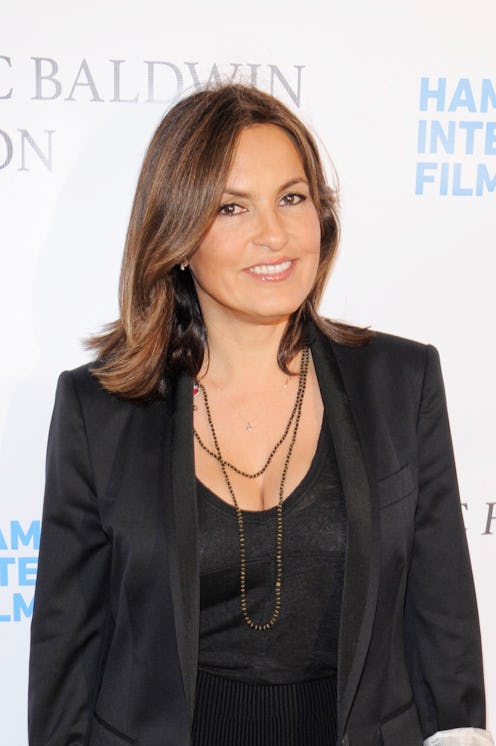
For the past 18 years and counting, Detective Olivia Benson has been one of the dedicated detectives investigating "vicious felonies" on Law & Order: Special Victim Units. The character fights injustice, especially when it comes to sex-based crimes, and her real-life counterpart is doing the same. In 2004, actor Mariska Hargitay founded the Joyful Heart Foundation, an organization focused on transforming society's response to sexual assault. Tying into that mission, Hargitay recently produced I Am Evidence, an HBO documentary about the thousands of rape kits that go untested in the U.S. The film has debuted at the 2017 Tribeca Film Festival, and its message is clearly close to the actor's heart.
While on the red carpet at the Tribeca Film Festival Women’s Filmmaker Luncheon hosted by CHANEL on Friday, Hargitay speaks to reporters about this passion project and how it tackles an issue we should all be paying closer attention to. "I thought this was sort of a perfect microcosm of the issues at hand right now," the SVU star says. "The way these kits are tested, these are human lives. And the way these issues are valued, or not valued, is the way that women are valued."
"The bigger goal is to change the way we regard women on this planet."
Taking the movie's intended purpose a step further, Hargitay elaborates, "So, this is a film that is also about the value of women and showing the way the culture regards these crimes." The fact that rape kits go unnoticed, in a way, dismisses the stories of women — and that's simply unacceptable. In spotlighting this issue, hopefully, the doc can help change that perception.
According to the movie's Tribeca page, "Over 175,000 kits have been uncovered to date, resting in backlogs and storage facilities, each of them an unsolved case." Considering RAINN's statistic that one American is sexually assaulted every 98 seconds, these tests are crucial. As explained on EndTheBacklog.org, DNA tests are key in solving and preventing such crimes. When the kits go untested, it leads to victims being ignored, as well as perpetrators going free. To date, only eight states have laws requiring rape kits to be tested by police; that's a disheartening statistic.
Hargitay deems getting rid of the backlog of rape kits the Joyful Heart Foundation's number one advocacy goal. (The org also focuses on healing, education, and advocacy.) "The goal [of the movie] is obviously to end the backlog," she says. "But I think the bigger goal is to change the way we regard women on this planet."
This documentary is one way that Hargitay is helping change the way women are regarded for the better. By acknowledging the ongoing issue of untested rape kits, the movie takes sexual assault victims and their stories seriously. Not only that, but it can hopefully prevent this backlog from continuing to pile up through raising awareness.
Of course, this isn't an issue that can be solved overnight. But speaking out and acknowledging it's happening is the first step in sparking change. And this film couldn't have happened without people who believe in the importance of that mission. As Hargitay's point out, she and Trish Adlesic, I Am Evidence's co-director and co-producer, worked tirelessly to make the movie happen.
"We knew with my schedule challenges, it was going to be a creative process," Hargitay says. "We did it, and we just made it work... That's like the badass-ness of women. They just figure it out, they just do it."
For the pair, this meant meeting up at night after Hargitay filmed SVU for hours, in addition to working weekends — basically fitting in the project whenever they could. That's how strongly they felt about the film's mission — but that doesn't mean it was easy. Challenges arose, but, she says, they tackled them in a "beautifully powerful, feminine way." And she adds, "It's been such an incredible experience, because I've never really done a project with just women."
All in all, I Am Evidence sounds like a must-watch movie about an issue that needs to be addressed. As Hargitay said herself, women are badass. They have the power to make a tangible difference. And their stories and experiences can't just be brushed under the rug — or kept in backlogs — any longer.